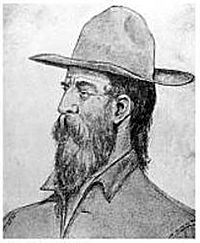Pauline Weaver facts for kids
Quick facts for kids
Pauline Weaver
|
|
|---|---|
 |
|
| Born |
Powell Weaver
1797 |
| Died | June 21, 1867 Camp Verde, Arizona, USA
|
| Nationality | American |
| Occupation | Frontiersman |
Pauline Weaver (born Powell Weaver, 1797 – June 21, 1867) was a famous American frontiersman, trapper, and explorer. He was very active in the early Southwestern United States, especially in Arizona. Many places in Arizona are named after him, showing his importance in the region's history.
Contents
Pauline Weaver's Early Life and Adventures
Pauline Weaver was born as Powell Weaver in White County, Tennessee, in 1797. His father was of German background, and his mother was from the Cherokee Nation. When he was a young man, he worked for the Hudson's Bay Company, a fur trading company, in Canada.
Journey to the Southwest
In 1830, Weaver joined a group of nearly 50 men on a trapping trip. This journey took him to the Rocky Mountains and then to Taos, New Mexico. Taos became his main base for trapping and trading. It was in Taos that his first name, Powell, changed. Spanish speakers called him "Paulino," which then became "Pauline" to English speakers. In 1831, he traveled from Taos to California, passing through Arizona for the first time.
Family Life and Relationships
In August 1832, Weaver became a Catholic. The next month, he married Maria Dolores Martin in Taos. They had one son and two daughters. Later, he also married a Native American woman in Arizona. In 1845, Weaver settled on a ranch near Banning, California, where he lived for over ten years.
Weaver was known for having good relationships with the Native American tribes in the region. He often tried to help American settlers and Native Americans get along. Even with these good relations, Weaver was seriously injured in a conflict in the 1860s.
Weaver's Military Service and Gold Discoveries
Pauline Weaver served the military for many years. In 1846, General Stephen W. Kearny asked Weaver to be a scout for the Mormon Battalion. A scout is someone who explores ahead of an army to gather information. For the next 20 years, Weaver worked as a scout and helped the Army communicate with different Native American tribes.
Civil War Role
During the American Civil War, Weaver was the Chief of Scouts for the federal forces. He played a key role in a battle against a Confederate unit on April 15, 1862. This fight, known as the Battle of Picacho Pass, happened in Arizona.
Finding Gold in Arizona
In 1862, Native Americans showed Weaver where to find gold on the east side of the Colorado River. This discovery started a "gold rush," where many people came looking for gold. It also led to the creation of La Paz, Arizona, which is now a ghost town. A year later, Weaver led another group, the Peeples party, to search for gold. They went up the Hassayampa River to the Weaver Mountains. There, they found a lot of gold at a place called Rich Hill, near present-day Yarnell, Arizona. Because of his discovery, the mining area was named the Weaver District.
Pauline Weaver's Final Resting Place
Pauline Weaver passed away in 1867. He was buried at the Camp Verde army post with full military honors. This was to recognize his service in the military and his efforts to keep peace with Native American tribes.
Journey to Arizona
When the Camp Verde army post closed, Weaver's remains were moved to San Francisco, California. But his journey wasn't over. In 1929, Boy Scouts and school children in Arizona raised money. They wanted his body to be returned to Arizona. So, he was buried for the third and final time on the grounds of the Arizona territorial capital in Prescott, Arizona.
Arizona Places Named After Pauline Weaver
Many places in Arizona are named after Pauline Weaver, honoring his contributions to the state's history:
- Weavers Needle in the Superstition Mountains
- Weaver Creek in Yavapai County
- Weaver Mountain in Yavapai County
- Weaver Mountains in Yavapai County
- Weaver Peak in Yavapai County
- Weaver Pass in La Paz County
- Weaver Wash in La Paz County
- Weaver, Arizona, a ghost town in Yavapai County
 | Dorothy Vaughan |
 | Charles Henry Turner |
 | Hildrus Poindexter |
 | Henry Cecil McBay |

